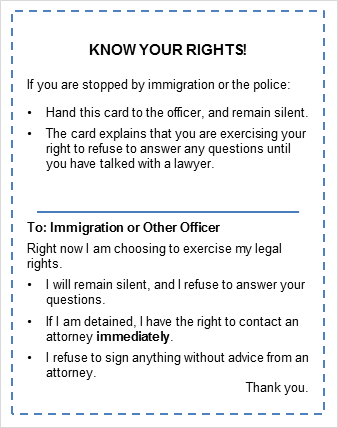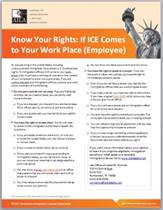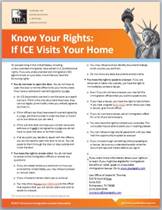Know Your Rights: Undocumented Immigrants Have These Rights, Too
Know your rights. Everyone living in the U.S. has certain basic rights under the U.S. Constitution. Undocumented immigrants have these rights, too. It is important that we all assert and protect our basic rights.
If you find you have to deal with Immigration and Customs Enforcement (ICE) or other law enforcement officers at home, on the street, or anywhere else, remember that you have the rights described in this factsheet. The factsheet also provides suggestions for what you should do to assert your rights.
- You have the right to remain silent. You may refuse to speak to immigration officers.
- Do not answer any questions. You may also say that you want to remain silent.
- Also, do not say anything about how you entered the U.S. or where you were born
- Carry a know-your-rights card and show it if an immigration officer stops you.
- The card explains that you will remain silent and that you wish to speak with an attorney.
- Do not open your door.
- It is important to not open your door unless an ICE agent shows you a warrant. (They almost never have one.) To be allowed to enter your home, ICE must have a warrant signed by a judge. If an ICE agent wants to show you a warrant, they can hold it against a window or slide it under the door. To be valid, the warrant must have your correct name and address on it.
- You do not need to open the door to talk with an ICE agent. Once you open the door, it is much harder to refuse to answer questions.
- You have the right to speak to a lawyer
- You can simply say, “I need to speak to my attorney.”
- You may have a lawyer with you if ICE or other law enforcement questions you.
- Before you sign anything, talk to a lawyer.
- ICE may try to get you to sign away your right to see a lawyer or a judge. Be sure you understand what a document actually says before you sign it.
- Always carry with you any valid immigration document you have.
- For example, if you have a valid work permit or green card, be sure to have it with you in case you need to show it for identification purposes.
- In addition, do not carry papers from another country with you, such as a foreign passport. Such papers could be used against you in the deportation process.
- If you are worried ICE will arrest you, let the officer know if you have children.
- And, if you are the parent or primary caregiver of a U.S. citizen or permanent resident who is under age 18, ICE may “exercise discretion” and let you go.
Print, Cut Out, Fold and Carry in your Wallet or Purse
Questions? Contact an Experienced Immigration Lawyer
If you or your family members have any questions about your immigration status, it is important to consult with a qualified immigration lawyer. Call immigration attorney Jessie M. Thomas at (214) 838-0045 or contact Law Office of Jessie M. Thomas office for answers.
More Factsheets to Help you Understand Your Rights at Home and in the Work Place
View online, download, or print and share with others



